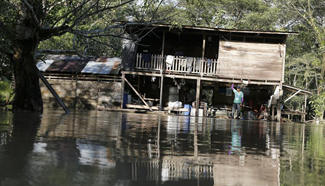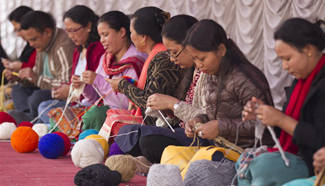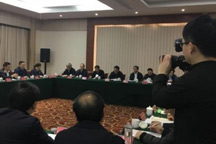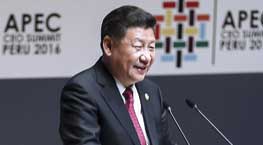By Xinhua Writers Lyu Qiuping, Chen Guozhou and Wu Xiaokang
BEIJING, Nov. 26 (Xinhua) -- As another round of smog smothers Beijing on an icy winter afternoon, Yu Shulan cannot help coughing a little.
Once again, she starts missing home, a coastal town 700 kilometers away in Shandong Province with clean air and fresh seafood.
In the past, this time of year meant gathering with her neighbors, chatting, playing cards and waiting for an evening of dancing in the square at the center of town.
Now, with no friends and family around, she simply plays card games on a computer after her 19-month-old granddaughter falls asleep.
"I am thinking of weaving her a cap. Not that we cannot afford to buy one, but I need something to do to kill the time," says Yu, 64, who lives in a neighborhood in Huangcun town, Beijing's Daxing district.
There are 18 million people aged 60 and above who live more than six months a year away from their registered hometowns, according to a migrant population report released by China's National Health and Family Planning Commission (NHFPC) in October.
Unlike young migrants who are quick-learners and have large social circles in the big cities, the elderly have fewer friends and less access to health care, often finding it hard to adapt to an alien world.
Zhang Zhenhui, 62, is a native of Hezhou city, Guangxi Zhuang Autonomous Region. His son works in real estate in the regional capital Nanning.
In 2013 when Zhang's daughter-in-law was about to give birth, Zhang and his wife moved to Nanning to nurse the baby.
Now that his grandson is going to enter kindergarten, Zhang has told his son that they are leaving to take care of a second grandchild, to be delivered by his daughter back home.
"Actually, it is just an excuse; we are tired of living here," he says. "All we do is to buy groceries, do chores and nurse the baby!"
Zhang says babysitting is tiring and boring, and his son and daughter-in-law seldom talk to him after work, making Zhang and his wife feel even more lonely. "My only comfort is to see my grandson growing up each day."
In China where most young women have jobs, children are usually looked after by their grandparents. While young people flow into the big cities to earn a living, their parents often join them to help with the children. In the past two years, as China relaxed its family-planning policy, allowing families to now have two children, such arrangements are even more common
According to the NHFPC report, up to 43 percent of elderly migrants take care of their grandchildren.
While many senior citizens leave their hometown to look after their grandchildren, others head to cities to have their family look after them. Xu Shouye, 71, is one of them.
After his wife died two years ago, Xu moved from a rural area in Henan Province to Chongqing Municipality, southwestern China, where his son works.
Despite the flushing toilet and gas kitchen, Xu describes his life as "like a prison."
"My son will not let me go outside because he thinks I will get lost," he says. "It is like a cage."
Because of language barriers, he has also failed to make any friends the past two years.
"I cannot join my neighbors to play mahjong because I do not understand a word they say," he says. "They don't even have heatable brick beds here in Chongqing, which adds to my suffering."
Xu has proposed returning home several times, but his son refuses. "He reckons the villagers will think he is not filial if he leaves me alone in the countryside," he says.
Although China is speeding up construction of nursing homes for the elderly, most people believe children should take care of their parents.
This year Xu was diagnosed with heart disease. "I think this could be related to my bad mood," he says.
Worse, none of Xu's medical bills are covered as he does not have local health care coverage in Chongqing.
Zou Shunkang, a public administration professor with Southwest University in Chongqing, says the migrant elderly, away from their social circle, feel isolated in cities, and the generation gap between the children, and grandchildren, makes things worse.
Apart from urging young people to talk with their parents and address their emotions, Zou advises volunteers and social organizations to offer more services for senior citizens.
"Local governments should step up efforts to break regional disparities in social benefits so that migrants, be they elderly or young, can have their medical expense covered as soon as possible," he says.
Much to her comfort, Yu Shulan has recently made new friends in her neighborhood, a couple also from Shandong who came to Beijing to take care of their twin grandchildren.
"They have invited me to visit," she says." Maybe we will bring the children to go to the park or supermarket together."
(Xinhua reporter Zhong Quansheng contributed to the story.)










